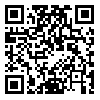Volume 7, Issue 27 (2014)
LCQ 2014, 7(27): 11-28 |
Back to browse issues page
Download citation:
BibTeX | RIS | EndNote | Medlars | ProCite | Reference Manager | RefWorks
Send citation to:



BibTeX | RIS | EndNote | Medlars | ProCite | Reference Manager | RefWorks
Send citation to:
Poornamdarian T. Linguistic Propositions and the Literariness of Speech. LCQ 2014; 7 (27) :11-28
URL: http://lcq.modares.ac.ir/article-29-9150-en.html
URL: http://lcq.modares.ac.ir/article-29-9150-en.html
Professor of Persian Language and Literature, Institute for Humanities and Cultural Studies
Abstract: (9847 Views)
This article studies the question of “meaning” in literary texts. First, I havepresented a definition for linguistic proposition. There is no proposition in language that does not have a linguistic definition; however,literature is replete with propositions without any acceptable referents. Under three circumstances the linguistic definition of a text is rendered null: (1) unconsciousness that is whenthe text indicates that the propositions were produced under an unconscious state; (2) anti-referentiality when the linguistic definition of a text is denied because itrefers to a referent that is inconsistent with our everyday experience; and (3) incongruity between the proposition and its producer, which happens when there is discrepancy between the linguistic definition of the propositions and our already-established assumptions about its producer. In conclusion, this article categorizes the propositions of a text in three categories:
Propositions with acceptable linguistic definition that refers to a known referent;
Propositions in which the secondary meaning is the speaker’s primary intended meaning and under this meaning they have external referents as well;
Propositions that—no matter what generated their semantic ambiguity—are without any acceptable linguistic definition and that are not congruent with our known world and resist comprehension.
Received: 2014/11/12 | Accepted: 2014/10/23 | Published: 2014/11/30
| Rights and permissions | |
 |
This work is licensed under a Creative Commons Attribution-NonCommercial 4.0 International License. |








